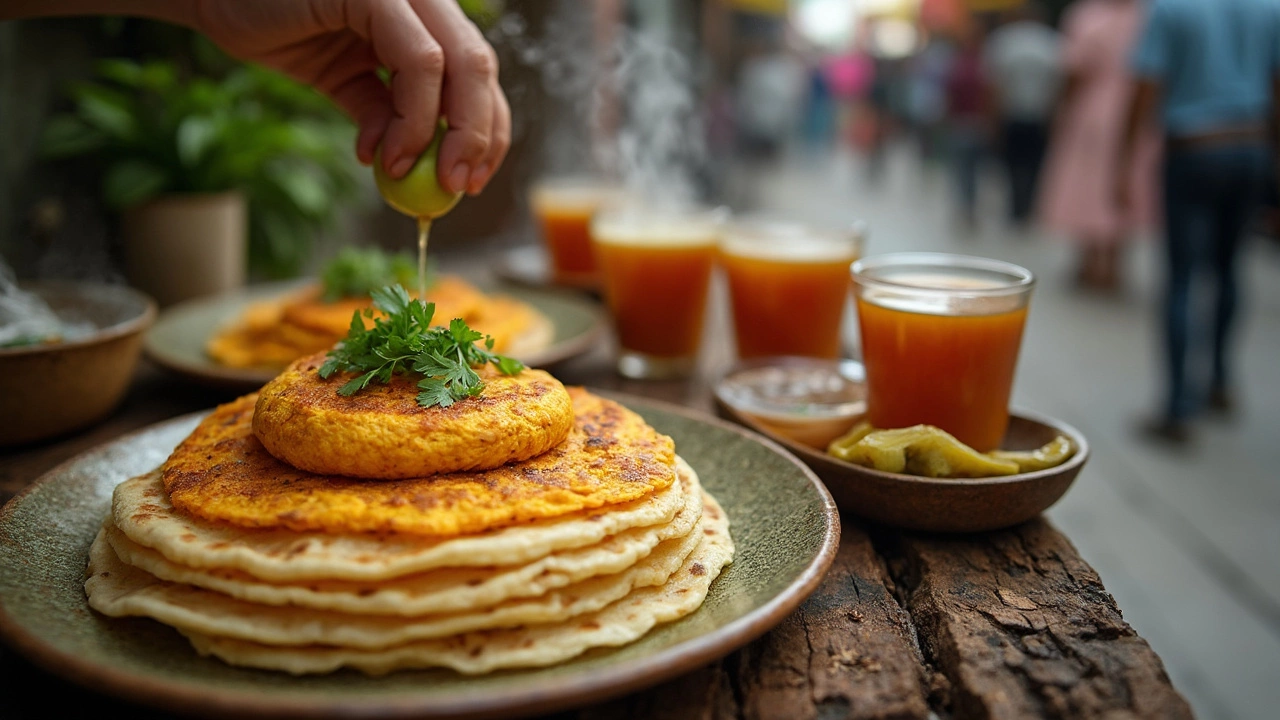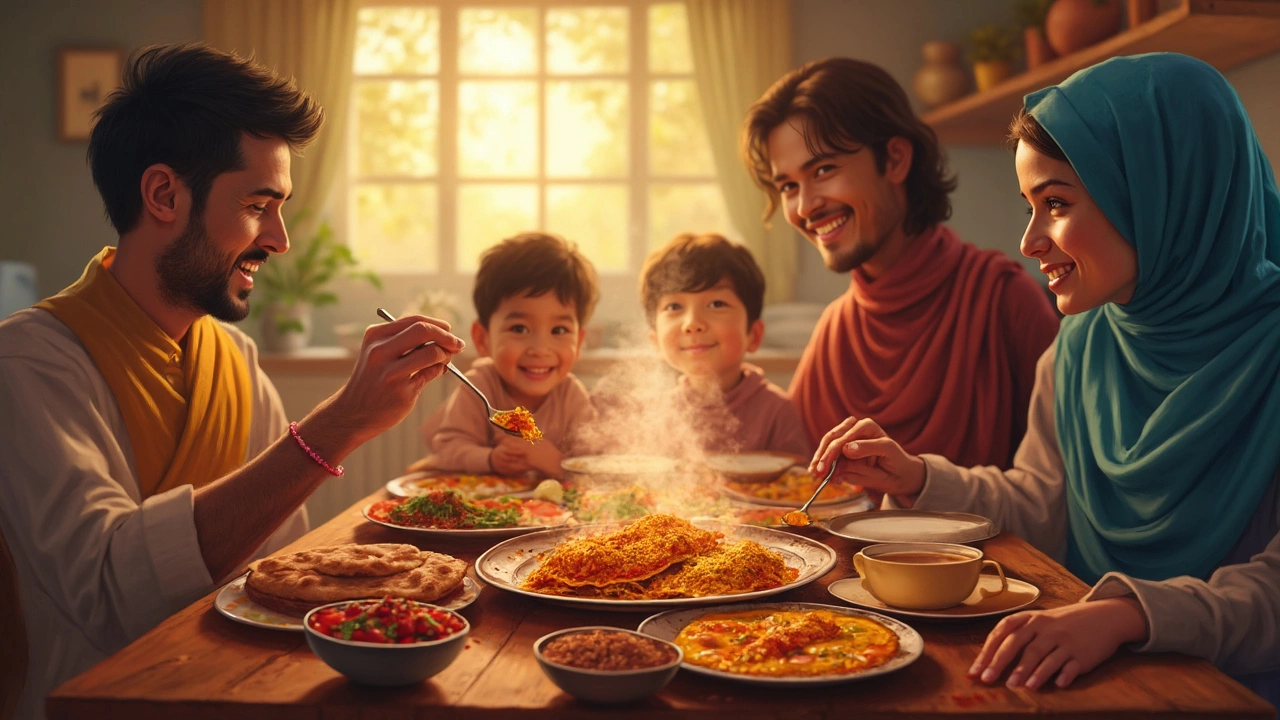If you landed here after searching "What do Indian Muslims eat for breakfast?" you’re definitely curious—and maybe even hungry. Forget the idea that breakfast is just bland toast or rushed cereal. In Indian Muslim homes, mornings start strong with dishes that come packed with flavor, warmth, and a surprising amount of variety.
You’ll find that most breakfast staples here are meant to keep you full till lunch, but they’re not complicated or time-consuming. Parathas stuffed with potatoes or lentils, spicy omelets tossed with onion and green chili, soft khichdi, and freshly fried puris are all regulars. Honestly, a lot of these dishes can hit the table in under half an hour—which makes them just as practical for anyone juggling work and family.
Spices are key, but so is convenience—because who has time to make biryani at 8am? Most families have shortcuts and tricks to speed things up. If you ever wondered why chai in Muslim households tastes a bit more special, it's the cardamom and crushed ginger that get thrown in, sometimes with a pinch of saffron if you’re lucky.
On busy days, street food like Anda Paratha roll (an egg-stuffed flatbread wrap), samosas, or tiny masala idlis find their way onto the breakfast plate—picked up from roadside stalls or made at home in minutes if you keep some dough or batter ready. These bites aren’t just tasty, they’re super practical for mornings when you’re already running late.
- Staples: What Shows Up on Most Muslim Breakfast Tables
- Classic Dishes and How They're Made Quick
- Street-Style Favorites for On-the-Go Mornings
- Regional Twists: North, South, and Beyond
- Smart Tips: Balancing Flavor and Speed
Staples: What Shows Up on Most Muslim Breakfast Tables
There’s no pretending here—Indian Muslim breakfast tables aren’t about delicate fare. The goal is simple: a meal that’s quick, filling, and keeps you satisfied all morning. Let’s get into the stuff that almost always makes an appearance.
- Parathas: This is probably the king of the table. You’ll spot plain parathas or ones stuffed with spiced potatoes (aloo), lentils (dal), or minced meat (keema). For busy mornings, people often prep the dough the night before, so breakfast comes together in a flash.
- Anda (Egg) Dishes: Eggs are breakfast gold. Masala omelet—beaten eggs with onion, green chili, cilantro, and tomato—is quick and shows up often, usually with paratha or simple chapati.
- Puri Bhaji: Puff up some puris (little fried breads) and pair them with a satisfying potato curry. It’s heavy, but on days you need extra energy, this one’s a lifesaver.
- Khichdi: Not just for when you’re sick! Many families enjoy moong dal khichdi (rice and lentil mash) or kichra (a dish with wheat, lentils, and meat) for breakfast because it’s mild, filling, and easy to digest.
- Bun Maska & Chai: Don’t underestimate this simple pair. Soft buns spread with plenty of butter, dunked in hot spiced milk tea—especially in cities like Mumbai and Hyderabad—are a daily routine for plenty of folks looking for a quick, lighter start.
Not everyone feasts every day. On work or school days, families might keep it super basic: leftover curry with roti, or just a sweet-and-savory toast with tea. And if it’s Eid or a weekend? Expect sheer khurma (vermicelli pudding) or shami kebabs with naan on the menu for that extra celebration touch.
| Breakfast Staple | Prep Time (Minutes) | Popular Pairing |
|---|---|---|
| Paratha (stuffed/plain) | 15-25 | Masala Omelet, Yogurt |
| Masala Omelet | 7-10 | Paratha, Bread |
| Puri Bhaji | 20-30 | Pickles, Tea |
| Bun Maska | 2-3 | Chai |
Most of these can be made in under half an hour if you’ve got your ingredients ready. The best part? There’s always chai—usually made strong with cardamom and sometimes a splash of evaporated milk, making it the finishing touch to any proper Indian Muslim breakfast.
Classic Dishes and How They're Made Quick
So, what makes a Indian Muslim breakfast stand out? The real stars are the classics: Anda Bhurji (spiced scrambled eggs), Keema Paratha, Suji ka Halwa, and Khichdi. These dishes aren’t just for fancy brunches—they’re totally doable on a busy morning. The trick? Prepping smart and using shortcuts that actually work.
Anda Bhurji (spicy scrambled eggs) is the quickest superhero here. You just toss onions, tomatoes, green chilies, and spices like cumin and turmeric into a hot pan, stir in a few eggs, and cook for 3-4 minutes. You don’t even need toast; scoop it up with leftover roti. And by the way, eggs are packed with protein, so you’re sorted till lunch.
If you’re into bread, Keema Paratha is a winner. It’s a flatbread stuffed with minced meat, onions, and a bit of coriander. Many families make the keema (mince) the night before. In the morning, stuffing it into dough and frying takes barely 10 minutes per paratha. Pair with some plain yogurt or even pickle if you’re in a rush.
Kids at home? Suji ka Halwa is a must. Grab semolina, butter (or ghee), sugar, and cardamom. All it needs is regular stirring—done in 15 minutes. Pro-tip: Make a small batch because it tastes best fresh.
If you want something light but filling, go for a quick khichdi. Mix washed rice, moong dal, turmeric, and salt—pressure cook for 10 minutes, and it’s done. Chopped spinach or peas can go right in. This is a lifesaver on rainy or rushed days.
- Chop veggies like onions and tomatoes ahead for speedy mornings.
- Pre-mix dry spices in a small box, ready to go for any Indian Muslim breakfast dish.
- Leftover chapatis? Use them instead of making fresh rotis for Bhurji or keema rolls.
Want a quick look at time and nutrition? Here’s a handy table:
| Dish | Prep + Cook Time | Main Nutrients |
|---|---|---|
| Anda Bhurji | 10 min | Protein, Iron |
| Keema Paratha | 15-20 min | Protein, Carbs |
| Suji ka Halwa | 15 min | Carbs, Fats |
| Khichdi | 15 min | Carbs, Protein |
Making these quick breakfast India favorites at home is totally doable. With just a little weekend prep and the right mindset, even a weekday morning can start on a delicious note.

Street-Style Favorites for On-the-Go Mornings
Sometimes you don’t have the luxury to sit down for breakfast. In many Indian cities, Indian Muslim breakfast traditions have a quick fix: street food you can grab and eat on your way to work or school. Honestly, some of these dishes are so legendary, you’ll find people skipping homemade food just to grab them from their favorite roadside stall.
Let’s talk about the real MVP—the Anda Paratha Roll. It’s basically a hot paratha, fresh off the tawa, with an omelet folded inside, loaded with onions, chilies, a squirt of tangy chutney, and sometimes even a smattering of leftover kebab. It’s portable, filling, and ridiculously simple to make at home if you’ve got leftover flatbread and eggs in your fridge.
Another icon is the Keema Pav—spicy minced meat cooked with peas and eaten with super-soft buttered buns. You see this a lot in Mumbai and Hyderabad, especially outside mosques and at train stations in the mornings. Not just meat lovers—if you’re vegetarian, aloo (potato) or paneer-based fillings find their way into similar bread-based snacks.
No Indian Muslim street breakfast is complete without Chai. Vendors everywhere whip up strong milk tea flavored with cardamom or fresh ginger, served in small glasses. Sometimes, people pick up a quick samosa—nothing fancy, just stuffed with potatoes or spicy minced meat. It’s hearty enough to power through busy mornings.
Here's a quick snapshot of what you might find on a typical street:
- Anda Paratha Roll – Egg-stuffed flatbread wrap
- Keema Pav – Minced meat with buttered buns
- Masala Chai – Spiced milk tea
- Pav Bhaji – Spiced vegetable mash with soft bread (often a go-to because it’s cheap and crazy filling)
- Samosa – Fried savory pastry with spiced filling
In cities like Hyderabad, it’s not rare to see bread dipped into nihari (a slow-cooked beef or mutton stew) as a quick pick-me-up—especially during the cooler months. In Lucknow, the must-try is sheermal (a sweet, saffron-topped bread) with eggs or spicy curry, sold from carts at the break of dawn. Many of these options ring in at under ₹50 (about $0.60) per serving, which is honestly a deal for a hot, satisfying breakfast.
| Street Dish | Main Ingredient | Average Prep Time | Typical Price (INR) |
|---|---|---|---|
| Anda Paratha Roll | Egg, Paratha | 8 mins | 30 |
| Keema Pav | Minced Meat, Bun | 15 mins | 40 |
| Samosa | Potato/Meat, Pastry | 12 mins | 15 |
| Masala Chai | Milk Tea, Spices | 5 mins | 10 |
If you want a quick quick breakfast India fix at home, prepping dough, marinating some keema, or boiling potatoes the night before makes all the difference. Trust me—having a street-style breakfast in your kitchen is easier than you think, and way more rewarding than grabbing plain toast on your way out.
Regional Twists: North, South, and Beyond
There's no single recipe for an Indian Muslim breakfast. What you’ll find on morning tables depends a lot on where you are in India. North, South, and even the coastal regions all have their own iconic picks—each one tailored for local tastes, weather, and what’s easy to get.
In North India, especially in cities like Lucknow or Delhi, breakfast often means stuffed parathas with spiced potatoes (aloo) or shredded radish (mooli). These are usually served with tangy pickles, thick yogurt, and a glass of milky masala chai. If you're in a hurry, Anda (egg) Paratha or bun-maska (sweet bun smeared with butter) might be on the table—fast, filling, and always satisfying. Kebabs like seekh or shami sometimes pop up at family gatherings, even before noon.
Now, swing down south to Hyderabad or parts of Tamil Nadu and Kerala. Here, you’ll run into idiyappam (string hoppers) with coconut milk or spicy egg curry, crispy dosas with fiery sambar, and khichdi made with rice and lentils—lighter but loaded with flavors from curry leaves, black pepper, and coconut. One popular Hyderabadi favorite: kheema paratha—minced meat tucked into crispy bread—often packed for the kids’ tiffin too. Sweet semiya (vermicelli) upma or payasam might also show up as a treat when there’s extra time.
The coast has its own thing going as well. In Mumbai, Muslim families love brun-maska (crunchy bread dipped in tea) and baida roti (flaky egg-stuffed bread). Further west and east, you’ll find rice cakes, fish cutlets, and sometimes even leftover biryani getting a morning makeover. In Bengal, Mughlai parathas—flaky breads stuffed with eggs and minced meat—are a high-energy way to start the day.
Check out this rundown of how different regions shake up quick breakfast India:
- North: Stuffed parathas, bun-maska, masala omelets, shami kebab.
- South: Idiyappam, dosas, semiya upma, kheema paratha.
- West Coast: Brun-maska, baida roti, fish cutlets.
- Bengal/East: Mughlai paratha, rice cakes, sweet shemai (vermicelli pudding).
Little regional tricks matter. In the north, ghee is generously used to fry parathas for extra flavor, while in the south, fresh coconut or curry leaves are key. Many families swap dishes on weekends just to break the routine—northern-style parathas in the south, or a plate of idlis making their debut in Delhi kitchens.

Smart Tips: Balancing Flavor and Speed
Making a quick breakfast India style doesn’t mean settling for plain or boring food. Indian Muslims nail this balance with a few clever habits and shortcuts.
First thing—batch prep. Lots of families prep dough for parathas or puris the night before. That way, in the morning, all you have to do is roll and cook. If you keep a container of chopped onions, tomatoes, green chilies, and coriander ready in the fridge, you’ll spend way less time making masala omelets, sandwiches, or upma.
Don’t ignore ready-to-go mixes, either. Some homes swear by homemade spice blends (like garam masala, chaat masala, or even sambar powder). A dash of these can transform plain eggs or leftover rice in minutes. You can also make a basic batter for dosas or besan chilla at night and keep it in the fridge for a super-fast fry-up next morning.
- Pressure cookers are game changers for getting khichdi or dal ready in 15 minutes. Modern electric cookers do the job even faster.
- Have a stash of ready-made rotis in the freezer? Warm them up, add leftovers, and you get a breakfast wrap in less than 10 minutes.
- Fresh herbs like mint and coriander punched into chutneys and spreads really boost flavor without adding any cooking time.
Think a strong cup of chai takes forever? Not really. If you boil water with tea, sugar, and spices together (instead of separately), you cut the steeping time and get that signature taste fast. Some tea stalls in Hyderabad serve more than 500 cups by 11 am, proof that strong tea doesn’t have to be slow.
| Dish | Prep Time | Tips for Speed |
|---|---|---|
| Paratha & Omelet | 20 min | Prep egg mix and dough at night |
| Khichdi | 15 min | Use a pressure cooker, soak rice overnight |
| Besan Chilla | 10 min | Ready batter speeds up cooking |
| Anda Paratha Roll | 12 min | Keep flatbread/roti pre-cooked |
If you want that full-on Indian Muslim breakfast flavor but you’re crunched for time, don’t overthink it. Prep a tiny bit the night before, use those spice blends, and mix and match leftovers with eggs or bread. You might be surprised just how quickly you can whip up something both delicious and legit filling.
